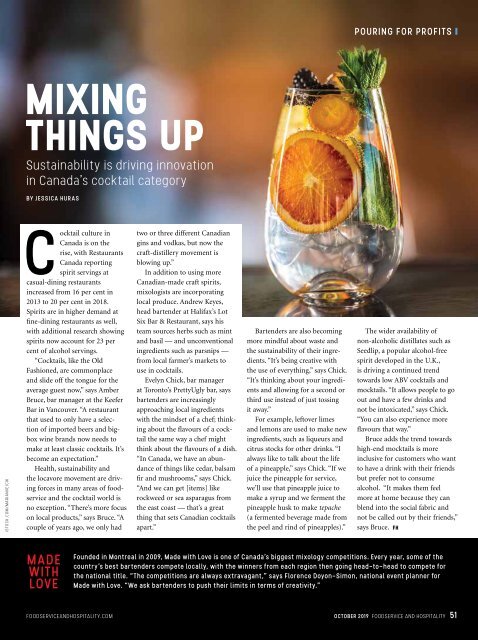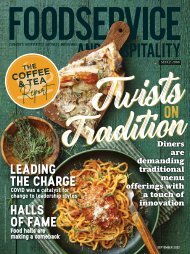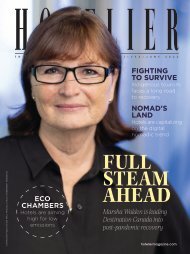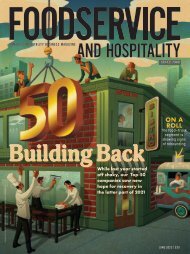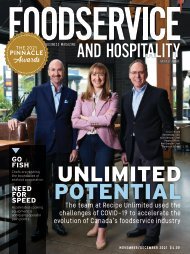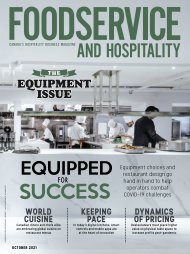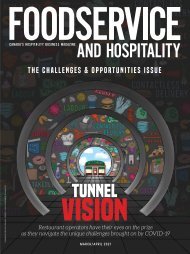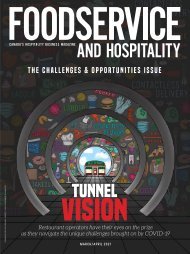October 2019 Digital Issue
You also want an ePaper? Increase the reach of your titles
YUMPU automatically turns print PDFs into web optimized ePapers that Google loves.
POURING FOR PROFITS<br />
MIXING<br />
THINGS UP<br />
Sustainability is driving innovation<br />
in Canada’s cocktail category<br />
BY JESSICA HURAS<br />
iSTOCK.COM/MARIANVEJCIK<br />
Cocktail culture in<br />
Canada is on the<br />
rise, with Restaurants<br />
Canada reporting<br />
spirit servings at<br />
casual-dining restaurants<br />
increased from 16 per cent in<br />
2013 to 20 per cent in 2018.<br />
Spirits are in higher demand at<br />
fine-dining restaurants as well,<br />
with additional research showing<br />
spirits now account for 23 per<br />
cent of alcohol servings.<br />
“Cocktails, like the Old<br />
Fashioned, are commonplace<br />
and slide off the tongue for the<br />
average guest now,” says Amber<br />
Bruce, bar manager at the Keefer<br />
Bar in Vancouver. “A restaurant<br />
that used to only have a selection<br />
of imported beers and bigbox<br />
wine brands now needs to<br />
make at least classic cocktails. It’s<br />
become an expectation.”<br />
Health, sustainability and<br />
the locavore movement are driving<br />
forces in many areas of foodservice<br />
and the cocktail world is<br />
no exception. “There’s more focus<br />
on local products,” says Bruce. “A<br />
couple of years ago, we only had<br />
two or three different Canadian<br />
gins and vodkas, but now the<br />
craft-distillery movement is<br />
blowing up.”<br />
In addition to using more<br />
Canadian-made craft spirits,<br />
mixologists are incorporating<br />
local produce. Andrew Keyes,<br />
head bartender at Halifax’s Lot<br />
Six Bar & Restaurant, says his<br />
team sources herbs such as mint<br />
and basil — and unconventional<br />
ingredients such as parsnips —<br />
from local farmer’s markets to<br />
use in cocktails.<br />
Evelyn Chick, bar manager<br />
at Toronto’s PrettyUgly bar, says<br />
bartenders are increasingly<br />
approaching local ingredients<br />
with the mindset of a chef; thinking<br />
about the flavours of a cocktail<br />
the same way a chef might<br />
think about the flavours of a dish.<br />
“In Canada, we have an abundance<br />
of things like cedar, balsam<br />
fir and mushrooms,” says Chick.<br />
“And we can get [items] like<br />
rockweed or sea asparagus from<br />
the east coast — that’s a great<br />
thing that sets Canadian cocktails<br />
apart.”<br />
Bartenders are also becoming<br />
more mindful about waste and<br />
the sustainability of their ingredients.<br />
“It’s being creative with<br />
the use of everything,” says Chick.<br />
“It’s thinking about your ingredients<br />
and allowing for a second or<br />
third use instead of just tossing<br />
it away.”<br />
For example, leftover limes<br />
and lemons are used to make new<br />
ingredients, such as liqueurs and<br />
citrus stocks for other drinks. “I<br />
always like to talk about the life<br />
of a pineapple,” says Chick. “If we<br />
juice the pineapple for service,<br />
we’ll use that pineapple juice to<br />
make a syrup and we ferment the<br />
pineapple husk to make tepache<br />
(a fermented beverage made from<br />
the peel and rind of pineapples).”<br />
The wider availability of<br />
non-alcoholic distillates such as<br />
Seedlip, a popular alcohol-free<br />
spirit developed in the U.K.,<br />
is driving a continued trend<br />
towards low ABV cocktails and<br />
mocktails. “It allows people to go<br />
out and have a few drinks and<br />
not be intoxicated,” says Chick.<br />
“You can also experience more<br />
flavours that way.”<br />
Bruce adds the trend towards<br />
high-end mocktails is more<br />
inclusive for customers who want<br />
to have a drink with their friends<br />
but prefer not to consume<br />
alcohol. “It makes them feel<br />
more at home because they can<br />
blend into the social fabric and<br />
not be called out by their friends,”<br />
says Bruce. FH<br />
MADE<br />
WITH<br />
LOVE<br />
Founded in Montreal in 2009, Made with Love is one of Canada’s biggest mixology competitions. Every year, some of the<br />
country’s best bartenders compete locally, with the winners from each region then going head-to-head to compete for<br />
the national title. “The competitions are always extravagant,” says Florence Doyon-Simon, national event planner for<br />
Made with Love. “We ask bartenders to push their limits in terms of creativity.”<br />
FOODSERVICEANDHOSPITALITY.COM<br />
OCTOBER <strong>2019</strong> FOODSERVICE AND HOSPITALITY 51


